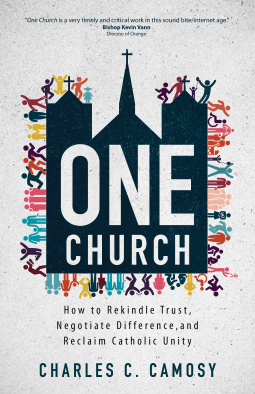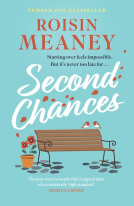
One Church
How to Rekindle Trust, Negotiate Difference, and Reclaim Catholic Unity
by Charles C. Camosy
This title was previously available on NetGalley and is now archived.
Send NetGalley books directly to your Kindle or Kindle app
1
To read on a Kindle or Kindle app, please add kindle@netgalley.com as an approved email address to receive files in your Amazon account. Click here for step-by-step instructions.
2
Also find your Kindle email address within your Amazon account, and enter it here.
Pub Date 25 Nov 2022 | Archive Date 5 Jan 2023
Talking about this book? Use #OneChurch #NetGalley. More hashtag tips!
Description
Vatican II baby boomers, trad millennials, zealous converts, Christmas and Easter Catholics—these are some of the humorous stereotypes theologian Charles C. Camosy uses to explain the points of view that divide today’s Church.
He says that in spite of our differences, unity and healing can be found through the fullness of the Gospel and an authentic understanding of the Catholic faith. In One Church, Camosy offers a hopeful and practical field guide for the here and now by sharing what it takes to listen and love those whose views are different than ours and to understand how we are united in the Body of Christ, the Church.
Throughout the history of the Catholic Church there have always been fundamental differences about how the faith should be expressed—for example, between Peter and Paul, Jerome and Augustine, Franciscans and Dominicans, left and right, “Rad Trads” and Vatican II Catholics.
In today’s climate of polarization, getting to unity-in-diversity has never been more difficult. Where Sts. Jerome and Augustine shared their differences by letter, social media is the place where division is most noticeable—and vitriolic—today.
Camosy, founder and director of The Catholic Conversation Project, offers five principles of dialogue to build on our unity as the Body of Christ:
· maintain a humble attitude;
· avoid binary thinking and dismissive name-calling;
· affirm and build on common ground;
· make Christ the center of everything; and
· lead with what you are for, not what you are against.
A Note From the Publisher
Camosy is the author of eight books, including the award-winning Too Expensive to Treat?, Peter Singer and Christian Ethics, and Beyond the Abortion Wars. Camosy’s book, For Love of Animals, was featured in the New York Times. He is the founding editor of The Magenta Project series and founding director of the Catholic Conversation Project.
Camosy earned bachelor’s and master’s degrees from the University of Notre Dame, where he also received his doctorate.
His writing has been featured in publications including the American Journal of Bioethics, the Journal of the Catholic Health Association, the New York Times, the Washington Post, the New York Daily News, the Los Angeles Times, Church Life Journal, Commonweal, America magazine, Crux, the Tablet, and the National Catholic Reporter. Camosy serves as a mortal theology consultant for Busted Halo. He is an advisor the faith outreach office of the Humane Society of the United States, the pro-life commission of the Archdiocese of New York, and Holy Name Medical Center. He received the Robert Bryne award from the Fordham Respect Life Club and the 2018 St. Jerome Award for scholarly excellence from the Catholic Library Association.
Advance Praise
“What does it mean to live as the Body of Christ? In One Church, Charles Camosy courageously names the full range of the maladies of division that plague our communities: generational, cultural, ethnic, political, social and historical. He opens out in a gentle and practical way how the healing balm of this depth of love might enter into the nooks and crannies of daily interactions within Church life. With conversational ease and light-touch humor, Camosy thoughtfully guides his reader into a deeper appreciation and empathy for the complexity at the root of these challenging tensions. With real life examples, he straddles the divisions to highlight the opportunities to learn, grow, build trust, and witness to the mutual love to which we are called as disciples of Christ.”
Amy J. Uelmen
Director for Mission and Ministry
Georgetown Law School
“Camosy has a remarkable capacity to speak uncomfortable truths and make you laugh at the same time. While this book may be ‘thin’ and ‘flat,’ the content is anything but. Readers will leave with the ability to ‘thicken’ and ‘add dimension’ to common Catholic caricatures, opening the possibility for relationship even in the midst of disagreement.”
Ann M. Garrido
Author of Let’s Talk about Truth
“Anyone who knows Camosy will know that his book is not a manual for compromising Catholic teaching in conversation and dialogue, but rather is about how to engage in conversation and debate in a way that is less likely to reproduce already polarized hostilities, which bear no fruit. This book suggests more likely ways of mitigating polarization that could ultimately generate a growing empathy and understanding for Catholic teaching, bearing fruit as Catholic teaching becomes a subject around which people feel more and more unified rather than polarized. But this takes strategic effort, and Camosy's book is here to help facilitate such effort. Highly recommended.”
John C. Cavadini
McGrath-Cavadini Director
McGrath Institute for Church Life
University of Notre Dame
“I gobble up anything Camosy writes, but his latest is especially tantalizing. Pope Benedict remarked that we Catholics are usually more ‘both–and’ rather than ‘either–or.’ Camosy’s book helps us achieve that. How timely this is during this synodality Pope Francis encourages with emphasis on trust, dialogue, and walking together.”
Cardinal Timothy Dolan
Archbishop of New York
“Building bridges across political, ideological, religious, racial, and ethnic lines is a neglected and urgent imperative to advance the common good. Camosy offers challenging and wise strategies to begin with our own behaviors and attitudes rather than the shortcomings of others. Pope Francis calls us to listen and learn, to encounter and dialogue, and this timely book can help us follow these paths. A little humility and humor, leading with what we are for, finding common ground around the Gospel, and principles of Catholic social teaching, offer ways forward in a wounded Church and polarized nation.”
John Carr
Codirector of the Initiative on Catholic Social Thought and Public Life
Georgetown University
“Charles Camosy’s new work, One Church, is a very timely and critical work in this sound bite/internet age. Even in my graduate study days I observed that at the tables in the refectory of the graduate house of the North American College in Rome the seats were at times occupied by like-minded (eg, liberal/conservative) students with little variation daily. It was only when I became close friends with priests beyond that divide that I began to truly grow as priest and student in the Eternal City. I would try to sit at different tables each day and spend time with the priest students and others with whom I lived and studied with daily. If I had not made that effort my life would be very much different now. Some of those friends from those days ‘across the divide’ have stayed in my life to this day, along with becoming associated with the Focolare movement mentioned by Camosy specifically. Those sorts of divides sadly have become much more pronounced in this time of ‘internet culture,’ with the tendency to label everyone, as Camosy notes in his book. To begin anew and set ourselves on a firmer, stronger and more joyful path of faith and life in the Body of Christ, he shows us the way, especially with his five-step strategy to engage those whom the Lord in his providence sends our way.”
Bishop Kevin Vann
Diocese of Orange
Available Editions
| EDITION | Paperback |
| ISBN | 9781646801527 |
| PRICE | $16.95 (USD) |
Average rating from 7 members
Featured Reviews
 Barb S, Media/Journalist
Barb S, Media/Journalist
An important read, but not an easy one. It's not that the writing style or subject matter is particularly complex or scholarly, but rather that the material hits home in a way that's sometimes uncomfortable. Dr. Camosy examines a number of stereotypes in Church life (the boomer, the millennial trad, the "Christmas & Easter Catholic," and others). After describing the "thin caricature" he goes on to deepen the discussion by examining what is in the heart of the person fitting the stereotype, what gifts and truths are proclaimed, and opportunities for unity in diversity. The author plays no favorites throughout the book, but treats each of the represented groups fairly, with continued reminders that everyone brings something important to the Church as a whole, and that stereotypes rob people of their dignity. A must-read for anyone who serves the Church, in particular.
Readers who liked this book also liked:
Linda Collister; National Trust Books
Cooking, Food & Wine, Crafts & Hobbies, Home & Garden
Chris Cook
History, Nonfiction (Adult), True Crime


















